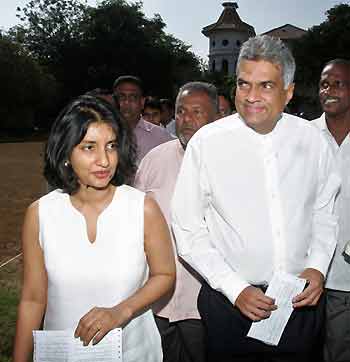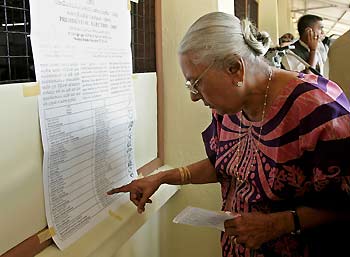|
Sri Lankans head to polls for new president
(Xinhua)
Updated: 2005-11-17 15:34
Sri Lankan presidential election started Thursday morning as 13.3 million men
and women began to cast their ballots to choose their new president from 13
contenders.
A grand of 13,327,160 people aged over 18 are eligible to vote on Thursday
during a nine-hour polling period from 7:00 a.m. (0100 GMT) to 4:00 p.m. (1000
GMT).
The election is staging at 10,486 polling stations islandwide including 233
cluster polling stations set up in the government controlled areas for the
voters residing in the Liberation Tigers of Tamil Eelam rebel controlled areas.

Sri Lankan presidential candidate and leader
of the main opposition party, Ranil Wickremesinghe (R), and his wife
Maithree walk toward a polling station in Colombo, Sri Lanka, November 17,
2005. [Reuters] | Among the 13 candidates, Sri Lanka's main opposition leader Ranil
Wickremesinghe and Sri Lankan Prime Minister and the ruling party's candidate
Mahinda Rajapakse are two of front runners.
"There has been no any reports of violence incidents so far in the country's
fifth president election and all polling stations are in order," Elections
Commissioner Dayananda Dissanayake said.
Counting of ballot papers will begin as soon as the voting ends and the final
result of the election will be announced early Friday, said Dissanayake.
The government deployed 24,000 police officers and more troops to keep order
during the presidential election, and over 22,000 election observers from local
and abroad were being detailed across the island country.
An independent poll survey had shown that the issue of cost of living and the
peace process with Tamil Tigers were the two main issues in the election.

A Sri Lankan woman looks at the name list of
presidential candidates at the entrance of a polling station in Colombo
November17, 2005. Sri Lankan began casting their votes in a close-fought
presidential poll on Thursday seen as a referendum on how to turn a truce
with Tamil rebels into lasting peace and develop a rural economy battered
by two decades of war.[Reuters] | Rajapakse has
pledged a tough line on the Tamil rebels as he forged election pacts with the
leftist JVP (People's Liberation Front) and the Sinhalese nationalist party JHU
(National Heritage Party).
In his manifesto, Rajapakse said the ceasefire agreement signed in 2002
between the government and the Liberation Tigers of Tamil Eelam (LTTE) was
short-sighted and national security was compromised by that pact.
Rajapakse proposed to critically examine the merits and demerits of the steps
taken so far to deal with the ethnic issue and consider a fresh approach.
"The ceasefire agreement will be amended so as to ensure that acts of
terrorism would not be permitted in any way. The ceasefire monitoring mechanism
would also be reviewed and new steps taken," said Rajapakse.
By contrast, the opposition United National Party leader Wickremesinghe vowed
to bring about a permanent resolution to the ethnic problem through a political
solution based on the current framework.
"The agreement arrived between the government and the LTTE and the Oslo and
Tokyo Declaration, which guarantees the unity, democratic character and
territorial integrity of Sri Lanka, has created the framework of a solution
acceptable to all communities of the country," Wickremesinghe said.
Rajapakse and Wickremesinghe also have different opinions on economic policy.
Rajapakse vowed to build up a "national economy" by attributing the positive
attributes of free market economy with domestic aspirations. Wickremesinghe put
more emphasis on free market policies and foreign investment.
Meanwhile, the LTTE has reiterated Wednesday that it will advise Tamil people
not to vote and denied newspaper reports that the LTTE was now actively
encouraging people to vote in the presidential election, a pro-Tigers Website
TamilNet said.
"Tamils cannot place our trust on either of the parties or their candidates
in the presidential election," Head of the LTTE's Peace Secretariat S. Pulidevan
was quoted saying.
A neck and neck campaign race and fine weather are expected to have more
voters to the election booths.
|